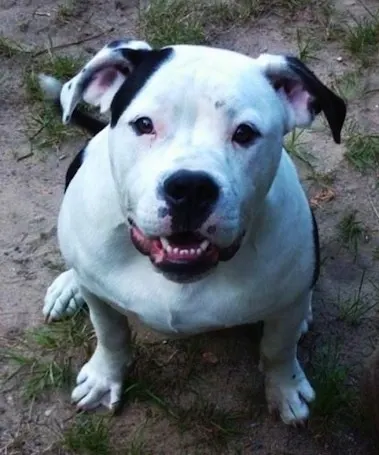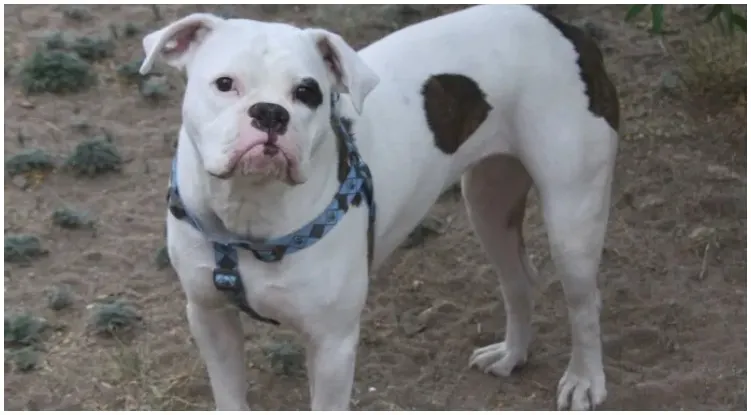Have you heard about the Colorado Bulldog? No, we don’t mean the drink which is a White Russian with a fizzy twist!
The Colorado Bulldog we’ll talk about is a dog. It was created in Colorado, the United States in the late 1990s. It is not considered to be a separate dog breed, even though there are certain differences from the regular Bulldog.
So, if you are curious to find out more about the Colorado Bulldog, then keep on reading this article.
While you’re here, why not learn about other dog breeds as well:
- Bernedoodle puppies: Five facts to know!
- Schnoodle puppies: The cutest hybrid breed ever
- Golden retriever Chow mix: Golden Chow
- Pitbull Beagle Mix: An unusual hybrid dog
- Pitbull Dachshund Mix: Complete Guide
Colorado Bulldog
The Colorado Bulldog is a short and sturdy dog. They have strong, muscular bodies and massive heads.
Their ears are small and turned downwards. The eyes of a Colorado Bulldog are set wide apart and they are dark and round.
They stand at 14 to 15 inches tall, male Bulldogs weigh around 50 pounds and females around 40 pounds.

The coat of a Colorado Bulldog is short, straight, glossy, and smooth. Similar to regular Bulldogs, Colorado Bulldogs can come in a variety of colors. But, the most common ones are white, black, grey — or a combination of these.
Personality
Colorado Bulldogs share the personality traits of other Bulldogs. This means that these dogs are complete sweethearts if trained properly. But, Bulldogs have a relatively bad reputation. Many people believe that they are aggressive dogs, but that couldn’t be further from the truth.
If you socialize them early and train your dog right — your Colorado Bulldog will get along with pretty much anyone! They are also alert, courageous, and brave dogs, which makes them pretty good watchdogs too.
Well-trained Bulldogs get along with children like no other! They are gentle, sweet, curious, and playful. They don’t have a problem approaching people and being held by a stranger.
But, if you don’t do the work of training your dog from an early age, Bulldogs may fall into their destructive behaviors.
Try to expose them to other people and animals as early as you can. A Bulldog won’t act aggressively unless he doesn’t know better!
Health & Lifespan
Bulldogs have thin coats, so if you live in a sunny area — consider sunscreen of UPF dog clothing to protect your dog from the sun. Just like humans, dogs can get skin cancer as well.
Other possible health concerns include:
- Hypothyroidism
- Heart disease
- Eye problems
- Hip dysplasia
- Allergies
- Reverse sneezing
So, make sure to keep your dog in good shape and feed him properly. Due to their short bodies, Bulldogs are also prone to obesity. A good diet and an active lifestyle will help you prevent all of these diseases.
The life expectancy of a Colorado Bulldog is between 12 to 14 years.
Exercise and Grooming
Bulldogs need moderate exercise and occasional walks. But, don’t take your dog out during warm days as the Bulldog’s short snout makes breathing difficult in such conditions.
Due to their short coats, Colorado Bulldogs are low-maintenance dogs. At least when it comes to grooming. Brush your Bulldog two or three times a week.
Bulldogs have deep wrinkles on their face that can sometimes cause some problems. Check and clean the wrinkles, ideally once a day. Dirt, moisture, and food can get stuck in these wrinkles possibly causing infection.
Also, pay special attention to the hygiene of the ears and area under the tail. Also, trim the Bulldog’s nails every two to three weeks.
And don’t forget to clean your dog’s teeth! Good dental hygiene will help them live a long and healthy life. And they will also be able to enjoy their favorite treats even as senior dogs.
Nutrition and Training of the Colorado Bulldog
High-quality food and a healthy and balanced diet are one of the most important things for the health of your dog. Buy high-quality food and determine the portions for your dog based on his age, activity, size, etc.
But, avoid overfeeding your Colorado Bulldog as they are prone to weight gain and obesity.
Bulldogs are not the fastest learners, but when they learn a new trick they won’t forget it till the rest of their lives. Bulldogs can also be a bit stubborn which can slow down the training. But, with a bit of persistence and patience, you will manage to train your dog.
While you’re here, read more about the human foods dogs can eat:
- Can dogs eat honey? How safe is it really?
- Can dogs eat lettuce and should they even eat it?
- Are Mashed Potatoes safe for dogs to eat
- Can dogs eat seaweed? Read before you feed
- Can Dogs Have Almond Milk?
- Is it ok for dogs to eat pancakes? The surprising truth
- Can dogs eat plums? The answer isn’t that simple

